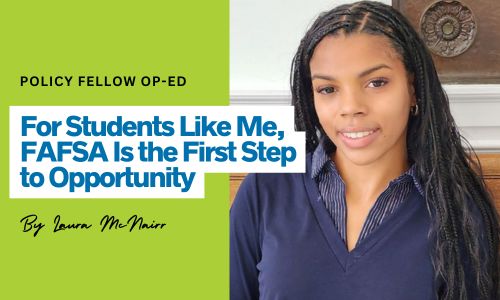News and Updates About Federal Financial Aid & the FAFSA: Students | Practitioners
Policy
For Students Like Me, FAFSA Is the First Step to Opportunity
May 27, 2025
By Laura McNair
-(903-x-678-px).jpg)
As a high school senior, trying to decipher the Free Application for Federal Student Aid form was overwhelming. As a Black student from a low-income household, I knew college was my pathway to opportunity. However, the financial barriers seemed too great to overcome. Through the complex process of completing FAFSA, my guidance counselor became essential to my journey. He helped me navigate each question and gather my parents’ tax information. This support made all the difference.
My completed FAFSA led to a QuestBridge match with Boston College and a financial aid package that has transformed my future. Now, as a junior at BC working as a policy fellow at uAspire, I share my story with others. The FAFSA wasn’t just a form to me; it was the bridge between saying “I can’t afford college” and proudly stating “I’m a Boston College student”.
But too many students don’t get that chance.
In Massachusetts, the high school class of 2024 left more than $63 million in Pell Grants unclaimed because they did not complete the FAFSA. According to the National FAFSA Tracker, our state’s FAFSA completion rate stands at 61%. This is comparably better than the national average of 54%, but still leaves significant resources unaccounted for. Research has shown that students who have completed the FAFSA have a better chance of attending college and staying in it, especially for those from low-income backgrounds and students of color.
The solution is clear: Massachusetts must do more to support students in completing the FAFSA.
It is clear that Massachusetts should encourage students to complete their FAFSA before senior year and provide opt-out options that respect privacy while encouraging participation. It is also important for Massachusetts to increase staff training in schools, particularly in districts with lower FAFSA completion rates. Additionally, public reporting and data-sharing through MEFA/EDWIN Analytics would allow for counselors to easily follow up with students who haven’t yet submitted their FAFSA.
For students like me, the FAFSA isn’t just a form, it’s the key to opportunity. Without it, I wouldn’t be at Boston College today. Every time I walk across campus, I am grateful for the guidance I had in completing the FAFSA. Universal FAFSA implementation would create clearer paths to higher education for Massachusetts students, regardless of their financial circumstances or background.
Let’s ensure every student in Massachusetts has the same opportunity.
My completed FAFSA led to a QuestBridge match with Boston College and a financial aid package that has transformed my future. Now, as a junior at BC working as a policy fellow at uAspire, I share my story with others. The FAFSA wasn’t just a form to me; it was the bridge between saying “I can’t afford college” and proudly stating “I’m a Boston College student”.
But too many students don’t get that chance.
In Massachusetts, the high school class of 2024 left more than $63 million in Pell Grants unclaimed because they did not complete the FAFSA. According to the National FAFSA Tracker, our state’s FAFSA completion rate stands at 61%. This is comparably better than the national average of 54%, but still leaves significant resources unaccounted for. Research has shown that students who have completed the FAFSA have a better chance of attending college and staying in it, especially for those from low-income backgrounds and students of color.
The solution is clear: Massachusetts must do more to support students in completing the FAFSA.
It is clear that Massachusetts should encourage students to complete their FAFSA before senior year and provide opt-out options that respect privacy while encouraging participation. It is also important for Massachusetts to increase staff training in schools, particularly in districts with lower FAFSA completion rates. Additionally, public reporting and data-sharing through MEFA/EDWIN Analytics would allow for counselors to easily follow up with students who haven’t yet submitted their FAFSA.
For students like me, the FAFSA isn’t just a form, it’s the key to opportunity. Without it, I wouldn’t be at Boston College today. Every time I walk across campus, I am grateful for the guidance I had in completing the FAFSA. Universal FAFSA implementation would create clearer paths to higher education for Massachusetts students, regardless of their financial circumstances or background.
Let’s ensure every student in Massachusetts has the same opportunity.